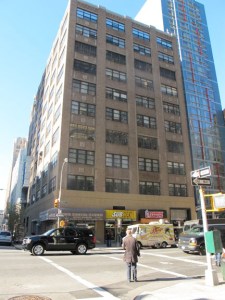Notwithstanding WeWork’s impressive track record of growth and success in the city, Sean Black knew his tenant wasn’t necessarily going to be an easy sell to landlords.
In just over a year, WeWork had opened three thriving locations, in midtown, Soho and the meatpacking district. The company leases offices, then prepares the facility for smaller tenants and rents out the space on a desk-by-desk basis.
Though there are several companies in the city in what is known as the office-suite business, WeWork has created a distinct concept by constructing space with open floorplans and glass partitioning, a layout that fosters interaction between the tenants.

“I don’t look at us as in the real estate business,” the company’s founder and chief executive, Adam Neuman, said. “We feel we’re building a physical social network, a new type of ecosystem. Thirty percent of our tenants end up doing business with each other.”
At a time when the nation’s weak job market has prompted a rise in entrepreneurship—particularly in talent-rich markets like Manhattan—WeWork’s space has been in hot demand. Mr. Neuman said that of the roughly 115,000 square feet his company leases in midtown Soho and meatpacking, virtually all of it is full. With a six-month waiting list of tenants clambering to get in, he knew it was time to open a fourth location.
In recent weeks, Mr. Neuman made his boldest move yet when WeWork inked a 75,000-square-foot deal at 175 Varick Street, its largest lease to date. On the surface, the deal looks like a breakthrough for all involved. WeWork will now have a location in Hudson Square, an office neighborhood that in recent years has begun to increasingly draw an influx of media and creative tenants, a segment of the economy that Mr. Neuman feels is vibrant with the kind of start-up ventures that will populate his space.
Meanwhile, Extell Development, the owner of a leasehold interest in 175 Varick Street, shored up most of the 150,000-square-foot building’s vacancy in the deal.
Yet Mr. Black, an executive who handles WeWork’s real estate transactions in the city and negotiated the firm’s lease at 175 Varick Street, spoke of the complexity and other hurdles involved in arranging the deal. WeWork’s search for a fourth New York location stretched on for six months, he said, a relatively lengthy time period that took as long as it did in part because many landlords Mr. Black contacted were hesitant to take the firm on as a tenant.
For owners, one cause of concern is the amount of traffic an office-suite user can bring to a property, potentially disturbing other tenants. Often, issues boil down to security, Mr. Black said.
“It’s often a matter of control,” Mr. Black said. “Landlords want to know who’s coming in and out of their buildings.”
WeWork had gotten around the problem in the past simply by finding properties that it could lease entirely. Full building leases are not common, however, and in order to accomplish its goal of leasing 75,000 square feet, WeWork knew it would have to be open to finding a way to integrate its operations into a multitenanted building.



